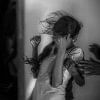Is photo retouching ethical?

Occasionally called editing, the proper term for pictures which are tweaked to look a certain way is "retouching." Photo retouching tools are powerful — they give you a choice to look closer to what you aspire to look like, but more and more people are calling out its ethical dimensions.
Photo retouching essentially means enhancing pictures and removing image imperfections before releasing them to the media. The extent a photo editor can retouch photos usually depends on them, sometimes stopping at colour adjustments such as cropping and resizing, increasing or decreasing contrast or warmth, etc.
The tool, however, can do a lot more, and therein lies the conflict. From having new objects appear in a picture to making existing ones disappear, the medium can often remove skin imperfections of models, make a body look larger or slimmer, and remove features such as body hair.
Believers of authenticism have called for a ban on such tools as it takes away from the model's identity and choice, often making them look more glamorous and perpetuating false and unattainable beauty standards. The problem takes on a more dangerous angle when photos are retouched with an intention to malign character, but that's an article for cyber-crime.
According to most expert photographers, there is a golden middle which can allow brands and photographers free reign with the aesthetics, without igniting the wrath of the more sensitive audience. They say that a well retouched photo is one in which the editor shows restraint, good sense and responsibility, as opposed to going all out in the name of creative freedom.
Rachel McAdams' new, empowered photoshoot recently showed her with a small paunch, and armpit hair. It boasted minimal retouching and received high praise from fans and celebrities alike. It showed the actress the way she really looks, debunking some beauty myths and double standards usually perpetuated by photo retouching on mainstream media.
Photo retouching can be a crucial tool to increase the self-confidence of a model, the same way that an unretouched picture can empower them to embrace their true selves. While opinions can differ, the goal is to make photography an inclusive and responsible act, as opposed to exclusively emphasizing a certain type of photography.
So, what is it going to be for you? Would you rather go for the dream, or the reality? Would you accept an unretouched picture?

 For all latest news, follow The Daily Star's Google News channel.
For all latest news, follow The Daily Star's Google News channel. 








Comments